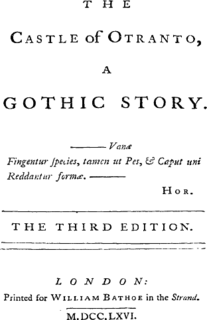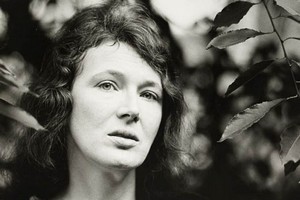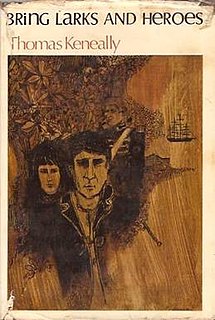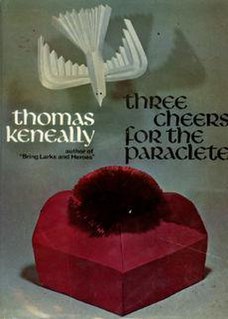
Gothic fiction, which is largely known by the subgenre of Gothic horror, is a genre or mode of literature and film that combines fiction and horror, death, and at times romance. Its origin is attributed to English author Horace Walpole, with his 1764 novel The Castle of Otranto, subtitled "A Gothic Story". Gothic fiction tends to place emphasis on both emotion and a pleasurable kind of terror, serving as an extension of the Romantic literary movement that was relatively new at the time that Walpole's novel was published. The most common of these "pleasures" among Gothic readers was the sublime—an indescribable feeling that "takes us beyond ourselves."

Joseph Thomas Sheridan Le Fanu was an Irish writer of Gothic tales, mystery novels, and horror fiction. He was a leading ghost story writer of the nineteenth century and was central to the development of the genre in the Victorian era. M. R. James described Le Fanu as "absolutely in the first rank as a writer of ghost stories". Three of his best-known works are Uncle Silas, Carmilla, and The House by the Churchyard.

Thomas Michael Keneally, AO is a prolific Australian novelist, playwright, and essayist. He is best known for his non-fiction novel Schindler's Ark, the story of Oskar Schindler's rescue of Jews during the Holocaust, which won the Booker Prize in 1982. The book would later be adapted into director Steven Spielberg's 1993 film Schindler's List, which won the Academy Award for Best Picture.

Angela Olive Pearce, who published under the name Angela Carter, was an English novelist, short story writer, poet, and journalist, known for her feminist, magical realism, and picaresque works. She is best known for her book The Bloody Chamber, which was published in 1979. In 2008, The Times ranked Carter tenth in their list of "The 50 greatest British writers since 1945". In 2012, Nights at the Circus was selected as the best ever winner of the James Tait Black Memorial Prize.
The Miles Franklin Literary Award is an annual literary prize awarded to "a novel which is of the highest literary merit and presents Australian life in any of its phases". The award was set up according to the will of Miles Franklin (1879–1954), who is best known for writing the Australian classic My Brilliant Career (1901). She bequeathed her estate to fund this award. As of 2016, the award is valued A$60,000.

The Bloody Chamber is a collection of short fiction by English writer Angela Carter. It was first published in the United Kingdom in 1979 by Gollancz and won the Cheltenham Festival Literary Prize. The stories share a theme of being closely based upon fairytales or folk tales. However, Carter has stated:
My intention was not to do 'versions' or, as the American edition of the book said, horribly, 'adult' fairy tales, but to extract the latent content from the traditional stories.

The Chant of Jimmie Blacksmith is a 1972 Booker Prize-nominated novel by Thomas Keneally, and a 1978 Australian film of the same name directed by Fred Schepisi. The novel is based on the life of bushranger Jimmy Governor, the subject of an earlier book by Frank Clune.

Barbara Janet Baynton was an Australian writer known primarily for her short stories about life in the bush. She published the collection Bush Studies (1902) and the novel Human Toll (1907), as well as writing for The Bulletin and The Sydney Morning Herald. She was a shrewd manager of her second husband's estate, owning properties in Melbourne and London. She acquired the title Lady Headley from her third marriage to Rowland Allanson-Winn, 5th Baron Headley, but never wrote under that name.

Rosie Scott was a novelist and lecturer, with dual Australian and New Zealand citizenship.

Bring Larks and Heroes is a 1967 novel by Australian author Thomas Keneally which won the Miles Franklin Award in 1967.

Three Cheers for the Paraclete (1968) is a novel by the Australian author Thomas Keneally. It won the Miles Franklin Award in 1968.
Feminist revisionist mythology is feminist literature informed by feminist literary criticism, or by the politics of feminism more broadly and that engages with mythology, fairy tales, religion, or other areas.

An Ordinary Lunacy (1963) is a novel by Australian writer Jessica Anderson.

The Fear (1965) is a novel by Australian writer Thomas Keneally. The novel is also known by the title By the Line.
This article presents a list of the historical events and publications of Australian literature during 1971.
This article presents a list of the historical events and publications of Australian literature during 1972.
This article presents a list of the historical events and publications of Australian literature during 1974.

Blood Red, Sister Rose (1974) is a novel by Australian writer Thomas Keneally.

Season in Purgatory (1976) is a novel by Australian author Thomas Keneally.
The Barbara Ramsden Award was administered by Fellowship of Australian Writers and awarded annually to an author and editor in recognition of the efforts of both parties to produce a quality fiction or non-fiction book. The winners receive a memorial plaque. It was established in 1971 and was awarded annually until 1992. It was reestablished in 2006 with sponsorship from Society of Editors (Victoria) Inc. The award was named after Australian editor Barbara Ramsden (1903–1971). It was cancelled in 2016.














